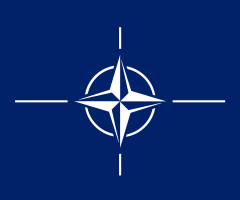The North Atlantic Treaty Organisation (NATO) is a political and military alliance of 29 European countries, Canada, and the United States of America (USA). NATO does work on cyber defence and coordinates these activities through the Cooperative Cyber Defence Centre of Excellence (CCDCOE), a multinational and interdisciplinary hub. NATO has strong cooperation with the European Union (EU) in many areas, including in cyber defence.
5G
NATO approaches 5G from a national security and defence perspective.
In March 2019, in the context of the USA and other NATO members expressing concerns over Chinese company Huawei and its role in providing 5G infrastructure, NATO Secretary- General Jens Stoltenberg announced that the organisation and its members were undertaking consultations on this subject and assessing the potential security implications of 5G networks.
In November 2019, the organisation updated its standards for resilient civilian communication systems, stressing the need for reliable communications systems, including 5G, robust options to restore these systems, and the thorough assessments of all the possible risks to communications systems. At their London meeting in December 2019, NATO members and allies expressed their commitment to ensuring the security of their communications, including 5G, recognising the need to rely on secure and resilient systems.
CCDCOE has been undertaking research on the cyber defence aspects of emerging technologies. In 2019, CCDCOE Law and Strategy branches released a paper, ’Huawei, 5G and China as a Security Threat’. The paper analyses factors that have led to Huawei’s current position as a dominant global supplier of 5G technologies. It argues that states are rational in demanding national security assurances as 5G becomes a widely used technology.
ARTIFICIAL INTELLIGENCE
Having declared cyberspace as an operational domain, NATO and its members are interested in the application of AI in cyber defence. The organisation is aware that AI and related technologies (such as autonomous weapons systems) will change the nature of warfare and that its members need to ‘be at the forefront of [technological] development to keep [their] technological edge’.
To this end, the NATO Communications and Information Agency (NCI) is committed to helping NATO explore AI and other emerging technologies and their implications for national and international security and defence. In the context of its cyber defence policy and its commitment to develop cyber defence capabilities, NATO is also investing in modernising its military resources, considering how technologies such as AI and autonomous systems can help NATO keep its edge.
NATO also convenes international dialogue on issues related to AI applications in defence and national security. For instance, the 2019 edition of the NATO Information Assurance Symposium (convened by NCI) – titled ‘Digital transformation: smart machines for smarter decisions’ explored issues related to AI applications in NATO missions and operations, and traditional and AI-enabled information assurance, among other topics.
5G
- NATO members commit to ensuring the security of their communications systems, including 5G, recognising the need to rely on secure and resilient systems.
ARTIFICIAL INTELLIGENCE
- Explores the applications of AI in defence and security
